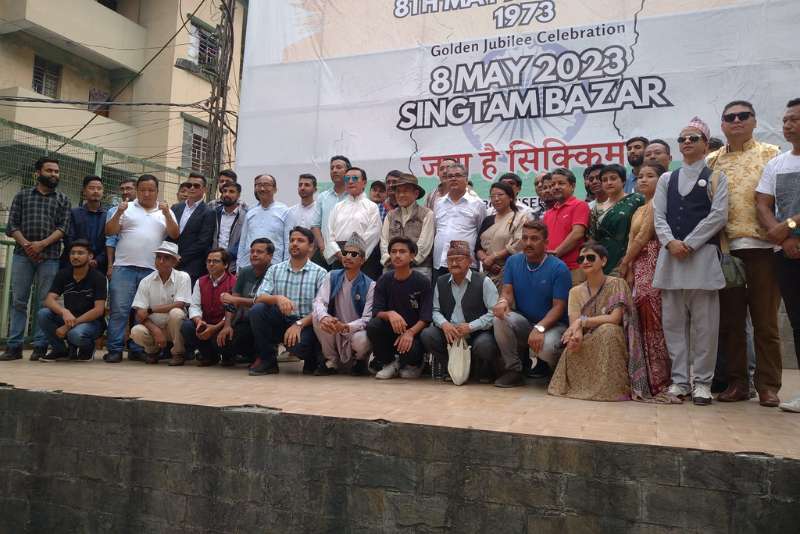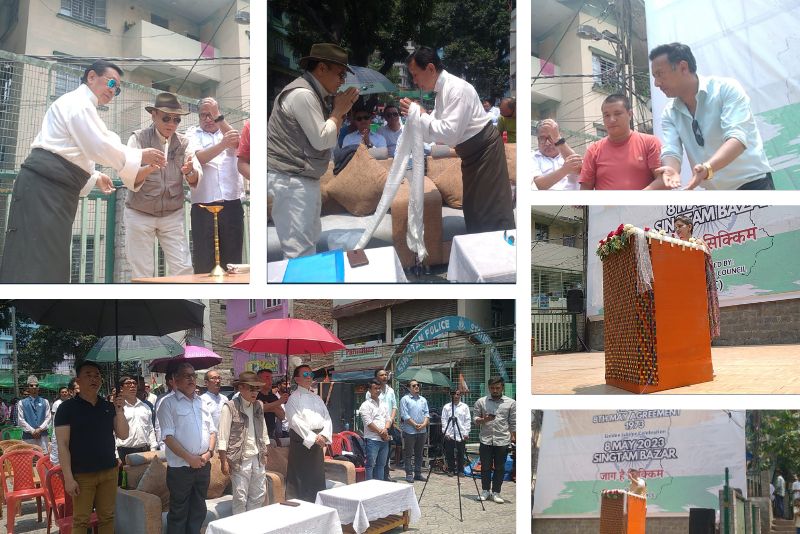
Gangtok: The Joint Action Council (JAC) marked the 50th anniversary of the historic Tripartite Agreement of May 8, 1973, in Singtam town on May 8, following the recent attack on JAC’s general secretary Keshav Sapkota. The ceremony was attended by distinguished guests, including Jigme Wangchuk Namgyal, the crown prince of the former Sikkim kingdom, and Tseten Tashi, convener of the Sikkim Bhutia Lepcha Apex Committee (SIBLAC).
During the event, JAC Vice President Duk Nath Nepal drew a parallel between JAC’s role in Sikkim and that of Rashtriya Swayamsevak Sangh (RSS) or Mizoram Youth Association in their respective regions. Nepal emphasized the need for an association that exclusively represents the interests of Sikkim and its people. He stated, “The Joint Action Council can be Sikkim’s own RSS or Mizoram Youth Association. We feel JAC is the answer, as its members include every Sikkimese citizen.”
JAC also expressed its support for the formation of district councils in the state’s six districts. Nepal highlighted JAC’s contribution in defending the Sikkimese definition during the Supreme Court judgment on January 13 and expressed the intention to establish a permanent group with district councils to safeguard Sikkim’s interests. He warned of the risk of Sikkimese citizens becoming displaced in their own land.
Reflecting on the historic May 8 Agreement, Nepal pointed out the consequences of past wrongdoings, stating, “We have lost our country due to the mistakes made between 1973 and 1975. The central leaders don’t understand our language or sentiments.” Nepal regretted the decision to abolish the monarchy and the subsequent integration of Sikkim into India, highlighting the challenges faced by the Sikkimese people. He expressed concerns that recent amendments to the Finance Bill could further impact the state’s demographics, saying, “Now, with new amendments in the Finance Bill, 1.4 billion Indians will enter Sikkim.”
Nepal also criticized certain intermediaries benefiting from Sikkimese issues, urging the people to support JAC’s cause rather than listening to these brokers. He affirmed the organization’s commitment to peaceful means while being prepared to retaliate if necessary. Nepal added, “The brokers label us as anti-nationals and file sedition charges against us. However, we do not consider ourselves anti-nationals.”
JAC Vice President Passang Sherpa urged the nation to recognize the significance of the tripartite agreement, which brought democracy to Sikkim. He cautioned against undermining Sikkimese rights and special status.
During a recent visit to Delhi, JAC representatives raised concerns about the inclusion of clause 5 in IT exemption and its implications for Sikkim. They questioned the central leaders about the mechanism to monitor its implementation. According to Sherpa, the central leaders cited the implementation of Article 14 in Sikkim as the reason for the new clauses in IT exemption. However, Sherpa argued that Article 14 cannot be included under 371F, stating, “When Article 14 is applied to Sikkim, it will be like a desert.”

The JAC’s commemoration event also served as a solemn reminder of the recent brutal attack on Keshav Sapkota, the General Secretary of the Sikkim Joint Action Council which highlights the dedication of JAC members to protect and promote the well-being of the Sikkimese people. The Joint Action Council’s commemoration of the Tripartite Agreement and its subsequent statements shed light on the organization’s aspirations to protect the rights and interests of Sikkimese citizens.
The JAC’s call for a dedicated association that exclusively represents the voice of Sikkim resonates with their belief that existing organizations, such as SIBLAC or the Khas Chettri Bahun Organization, primarily cater to specific communities. By positioning themselves as the representative body for all Sikkimese citizens, JAC aims to champion their interests and concerns on a broader scale.
Gangtokian Web Team, 09/05/23


















































